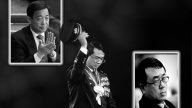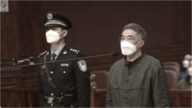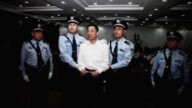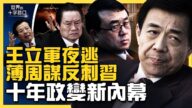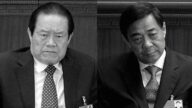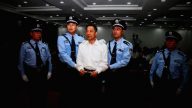【新唐人2012年6月18日讯】薄熙来被双规后一直被中纪委秘密审讯,最近有消息说,中共军方也介入到对薄案的审讯中。对于“同样是违法犯罪,薄熙来进入双规的隐秘程序,而对其妻谷开来的处理走的则是普通的刑事案件程序”,《纽约时报》6月14号分析说,双规只能是中共党内干部享受的“特殊待遇”。外界猜测,从“双规”的特征来看,薄熙来案可能难以公开审理。
双规的意思是“在特定时间、特点地点交代问题”。秘密、隔绝和严厉审讯手段是双规系统的标志,近10年来这种系统逐渐演化成制度化的中共党规,已成为中共政治权力斗争的一部分。
据内部人士透露,审讯薄熙来的人员中,除了中共纪委的人,还有来自军队政治处的人。薄熙来本人对“双规”这一审讯系统非常清楚,他曾在重庆借反腐打黑之名大肆清除政治对手,抓了数千人,一些人被处死。其中被双规的就有“前重庆警察局副局长彭长健”,官方说他在审讯当中死于心脏病发作﹔而前重庆交警总队队长陈洪刚,报导说他自己撞墙而死。
台湾时事评论员林保华:“秘密审讯的目地就是不要让老百姓知道他们具体的问题,这样他们就可以操控的,我想把它搞到什么程度,搞到什么方向,他都可以做到的。你比如说坦白从宽,但是也许双规的时候你越坦白,你越完蛋了,越要灭口了。因为你要坦白的时候,就要把上级都要交代了。另外比如说他想整什么人,就可以藉这个机会藉他的口供去整另外一个人。”
“东南大学”法学教授张赞宁律师认为,“双规本身就是违法的”,它不经过公检法就可以直接限制人身自由。另一方面,“双规”也是对党员犯罪的一种“保护措施”。
“东南大学”法学教授张赞宁:“因为我们党的领导干部的所有违法行为都是国家机密,那么司法机关也就自然而然也就不可以直接来介入,触及这些机密问题,必须由党的内部组织,也就是纪律检查委员会来进行审查。这里边有个司法漏洞,有的时候他明明是构成了犯罪,他可以通过双规检查后,不认为是犯罪,或者是做一些轻微的组织处理,比如开除党纪,降级降职处理就代替了司法处理,往往是这样的。”
“双规”的另外一个重要特征是“保密性”。旧金山一个主要在促进中国监狱制度改革的组织指出,保密是为了不损中共的面子,不伤其执政的合法性。这个组织据此预测,对薄熙来的指控不太可能公开。
官方数据显示,从2003到2008年超过88万党员被双规,但其中只有2.5万被司法起诉。
张赞宁律师主张取消“双规”,他指出,无论是多大的中共官员,违了法就应该由司法机关直接来处理,公布所有罪行,绳之以法,给公众一个交代。
采访/易如 编辑/许旻 后制/柏妮
Military Intervenes in Bo’s Trial, Shuanggui Closes Public Trial
Since being shuanggui, Bo Xilai has been detained for private interrogation by the Central Commission for Discipline Inspection.
Recently, the Chinese Army has also said to take part
in the prosecution.
Both Bo and his wife were charged.
Bo went into the shuanggui procedure while his wife, Gu Kailai, had an ordinary criminal case, perhaps it is the “one serious downside” amongst many advantages enjoyed by CCP membership, as New York Times’ June 14 issue stated.
It is believed that according to what’s known about shuanggui, Bo’s case is unlikely to be open to the public.
Shuanggui, or “double regulation,” requires party members
charged to appear at a specific time and place to answer questions.
It is characterized by its harsh interrogation in a secret
and closed environment.
Over the past 10 years, this system gradually institutionalized
and became a CCP regulation and part of CCP political power struggle.
According to insiders, Bo Xilai is being interrogated by CCP
Discipline Inspection Commission as well as the political department of the armed forces.
Bo himself is very clear about the procedure involved
in shuanggui.
In Chongqing, he used this system to treat political opponents in the name of being “against corruption and organized crime.” He arrested thousands, some of whom died.
Former Chongqing’s deputy police chief, Pang Cheung Kin, was the one facing shuanggui.
The official claimed he died of a heart attack during the trial.
Former Chongqing traffic police corps captain, Chen
Honggang, was another who underwent shuanggui and reportedly died of hitting the wall himself.
Taiwan’s political commentator Lin Baohua:
“The interrogation is to keep the public out of the real problems so that they can manipulate the case to any extent they’d like. For instance, during the interrogation, the more truth revealed might lead to more troubles, even to death.
Because once the truth is told, the superiors are likely
to be involved.
Another example is if someone else is also a target, the confession is going to be used to get that person.”
Attorney Zhang Zanning, Professor of Law at Southeast University, argues that shuanggui itself is illegal.
On one hand, it bypasses public security authorities and restricts personal freedom directly.
On the other hand, shuanggui protects party members
who commit crimes.
Zhang Zanning, Professor of Law at Southeast University: “All violations of CCP’s leading cadres are state secrets. These confidentiality issues are not touchable by the judiciary system, and can only be dealt with by the internal organization. That is the Commission for Discipline Inspection.
There is a judicial loophole.
Sometimes it is clearly a crime, after being shuanggui, it can
be ignored or punished with minor CCP rules such as expulsion from the party or demotion to avoid judicial procedures."
Another important feature of the shuanggui is secrecy.
A San Francisco organization, aiming to promote Chinese prison system reform, pointed out that secrecy is to save face and to protect the legitimacy of the CCP ruling.
This organization does not believe Bo’s case is going public.
Official statistics show that between 2003 and 2008 there were
more than 880,000 CCP members being shuanggui and only 25,000 of them were subject to judicial prosecution.
Attorney Zhang Zanning believes shuanggui should
be eliminated.
He insists that any and all CCP officials who violate the law should be subject to the judiciary prosecution, all crimes brought to justice and to the public, and the public deserves an answer.


